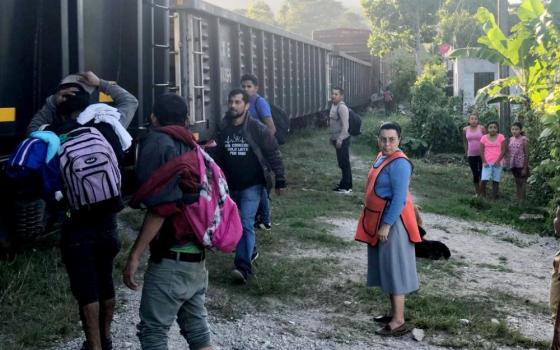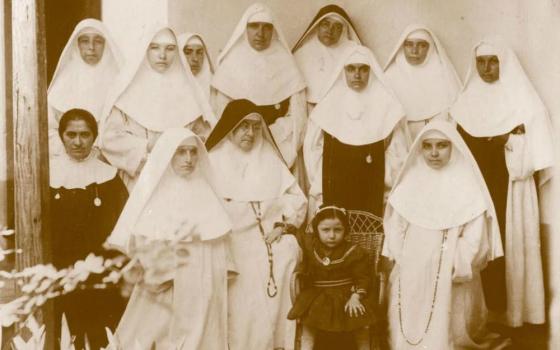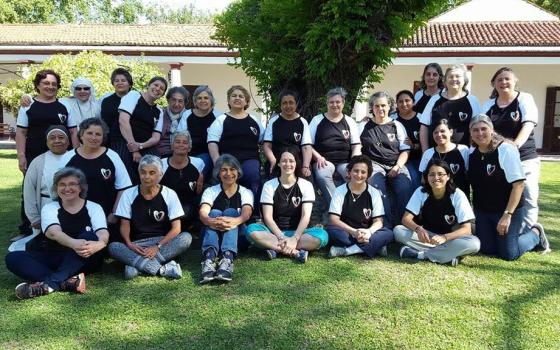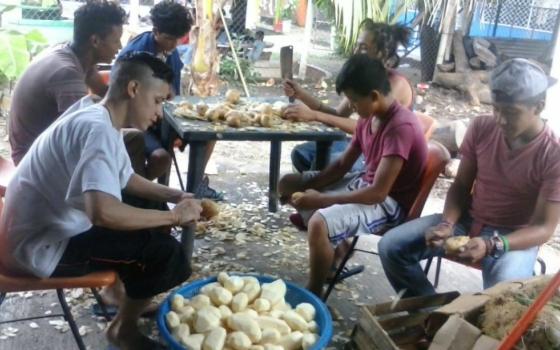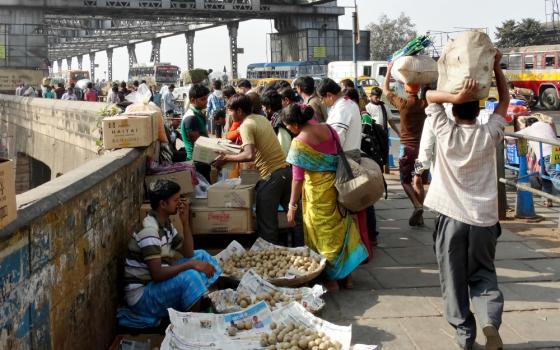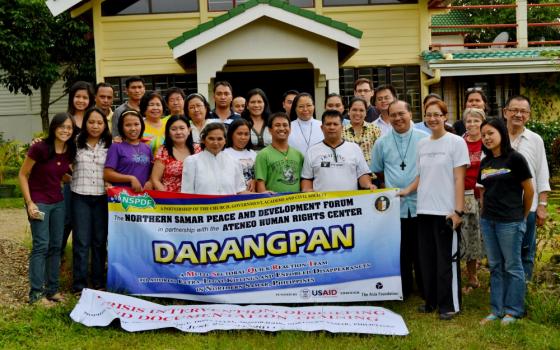A great variety of changes and challenges called the founders of congregations to discover and present-day sisters to rediscover their charism. We heard about it from our panelists this month as they responded to this question:
How have you or your congregation taken your mission or charism and adapted it to the culture of your surroundings or your country's history?
______
 María Alejandra Leguizamón Schija is a Dominican Sister of the Holy Name of Jesus in Tucumán, Argentina. Her academic preparation includes a pastoral specialization with an area of focus related to human trafficking. She works in pastoral ministry but also with a diverse group called Net "Kawsay," which gives workshops for all ages in border schools and neighborhoods.
María Alejandra Leguizamón Schija is a Dominican Sister of the Holy Name of Jesus in Tucumán, Argentina. Her academic preparation includes a pastoral specialization with an area of focus related to human trafficking. She works in pastoral ministry but also with a diverse group called Net "Kawsay," which gives workshops for all ages in border schools and neighborhoods.
Our congregation was founded in 1886 in response to one of the outcries of reality: a great cholera epidemic. At that time, Elmina Paz was a widowed woman who was in comfortable economic circumstances thanks to her marriage with Napoleón Gallo, a brilliant politician. They had large landholdings in the rural area of Tucumán. She was a pious woman and charitable with all the people around her.
The charism that inspired Elmina from the beginning was that of St. Dominic de Guzmán (also known as Dominic of Osma or Dominic of Caleruega). The Dominican charism included prayer, study for preaching, and a spirituality forged from three pillars: having charity, being humble, and practicing voluntary poverty.
But when the cholera epidemic broke out in Tucumán and left many children orphaned, the streets were overflowing with pain and sadness. Fr. Ángel María Boisdron, prior of the Convent of Santo Domingo in Tucumán and Elmina's spiritual director, invited her to help the children who were left homeless. She responded to this call, saying: "Not only will I open the doors of my house, but also of my heart. I will take care of them." Elmina and five other young women were the first to attend to the children orphaned by cholera in Tucumán.
Given the context in which our order, the congregation of the Dominican Sisters of the Most Holy Name of Jesus, was founded, we updated our charism by agreeing that we serve the orphans of our time, since we do not only attend to orphaned children but also to all those people who seek the truth in their lives. Through encounter, dialogue, debate and prayer, we forge new relationships that heal wounds and strengthen the path of encounter with God.
The pastoral projection of our charism is expressed in education, mainly in primary and secondary schools and universities but also in popular media, prison ministry, and high mountain missions. In each of these places, we are encouraged to know that we are sisters called to be and remain among the favorites of Jesus, who calls us and confirms us.
 Andrews Mary Robinson is a Franciscan Missionary of Mary sister. Indian by nationality, she has worked in Cuba, Mexico and Nicaragua, accompanying elderly women at an old-age home, doing pastoral work, ministering in villages and visiting families, prepare catechists, and working with women in income-generating activities. Now she lives in León, Mexico, studying educational administration.
Andrews Mary Robinson is a Franciscan Missionary of Mary sister. Indian by nationality, she has worked in Cuba, Mexico and Nicaragua, accompanying elderly women at an old-age home, doing pastoral work, ministering in villages and visiting families, prepare catechists, and working with women in income-generating activities. Now she lives in León, Mexico, studying educational administration.
God challenges us through the signs of the times, so our Franciscan Missionaries of Mary constitutions tell us to be attentive to the needs of the changing world.
Our Franciscan Missionaries of Mary province had been doing pastoral work in Mexican villages, but the growing number of migrants from Central American countries was a call for us to respond to this emerging need. It was the first time we had worked for our migrant brothers and sisters in this way, reaching out to them in solidarity.
It began when some of our sisters started visiting a center where migrants passing through could spend the night. The sisters went to the center once a week to cook and serve food. At times, they had opportunities to listen to the migrants' painful but sacred stories.
After reflecting on this, the province decided to focus on a particular area and serve the migrants on the south border of Mexico. There, migrants of all ages travel to the United States from Guatemala, El Salvador, Honduras and Nicaragua on the roofs of trains (collectively called "La Bestia," or "The Beast"), risking their lives looking for a better future. Our sisters often witness accidents and even deaths as these brothers and sisters try to climb on the train.
Three sisters were sent to form a community and to minister there full time, working in collaboration with Divine Word Missionary priests, volunteers and other organizations to satisfy their physical needs, give meaning and hope, provide legal advice and, if needed, help them find residency in Mexico. The sisters also create awareness among the local people about the needs of the migrants and motivate the locals to help provide for the migrants' needs.
The house where the migrant brothers and sisters are welcomed is called Bethania, Place of Hospitality. Those who come to rest in Bethania also contribute by cutting vegetables, serving food and doing other household chores.
This human movement has brought changes to the country, especially at the Mexican border, where we see people from other countries asking for alms or searching for jobs.
Our sisters offer the migrant brothers and sisters respect, compassion and hope, keeping in mind the words of our mother foundress: "To go to the poor and the needy is the thirst of my soul. My daughters are not my daughters if they do not fulfill it."
 Jane Quinlan belongs to the U.S. Province of the Ursulines of Tildonk. After many years in the classroom and missionary service in Goma, Democratic Republic of the Congo, she served four years in vocation ministry and represented her order at the United Nations. She now serves on her congregational leadership team in Brussels as assistant general superior.
Jane Quinlan belongs to the U.S. Province of the Ursulines of Tildonk. After many years in the classroom and missionary service in Goma, Democratic Republic of the Congo, she served four years in vocation ministry and represented her order at the United Nations. She now serves on her congregational leadership team in Brussels as assistant general superior.
St. Angela Merici (1474-1540), founder of the Ursuline Sisters, worked for the empowerment of women and girls in her time. Today, many of our Ursulines of Tildonk, energized by her spirit, improve the lives of others through education, pastoral work and health care in North and South America, Belgium, the Democratic Republic of Congo, and India.
Recently, while visiting Sisters Pratiti and Premdani in Kolkata, India, I learned how they are effecting change through their ministry with economically poor domestic workers. The workers have limited formal education, and their work is often undervalued and poorly regulated.
The two sisters have a loving relationship with the workers, who consider them their spiritual mothers. Sister Pratiti is coordinator for the ministry to domestic workers in the Calcutta Archdiocese, a service she was a pioneer in starting. Now, she carries out this ministry in collaboration with Seva Kendra, the archdiocese's social service center.
Domestic workers coming to Kolkata from remote villages require care, support and spiritual nourishment. Imagine the adjustment needed for women from a small village in Jharkhand who arrive in a sprawling, chaotic, noisy city!
The migrant domestic workers are often required to stay with the families who employ them and to provide domestic services such as cleaning, washing clothes, doing dishes, shopping, cooking, child care, or care of the aged. With their earnings, they help reduce extreme poverty in their own families.
The sisters and volunteers make home visits, offer legal aid and counseling, and encourage leadership among the domestic workers, who enjoy social gatherings, outings and cultural activities as well as programs on psychosocial and spiritual needs. At monthly meetings in a local Catholic church, the workers share prayer, stories and problems, thus creating good rapport and trust among members and their employers.
Peaceful resolutions are offered to settle disputes between employers and employees as well as among family members of the workers. A network has been set up to enable the women to stay connected through phone calls, visits and socialization. Workers have formed bonds of support and often share their talents, material resources, time and service. Their dignity is respected as they gain greater self-determination in claiming their legal, economic, social and political rights.
Through our work with domestic workers, we Ursulines are fulfilling a 2014 Chapter Direction Statement: "We adapt to the needs of our times and we become messengers of joy, peace and hope especially to the vulnerable."
 Christine Nasimiyu Masivo is a Missionary Sister of the Precious Blood in Kenya who did formation studies in Tanzania and Canada. Working at Kenya Broadcasting Company and Radio Maria in Uganda as reporter, editor, news director, producer and news anchor, she is now with Capuchin TV, a Catholic station in Kenya, while pursuing graduate studies in communication.
Christine Nasimiyu Masivo is a Missionary Sister of the Precious Blood in Kenya who did formation studies in Tanzania and Canada. Working at Kenya Broadcasting Company and Radio Maria in Uganda as reporter, editor, news director, producer and news anchor, she is now with Capuchin TV, a Catholic station in Kenya, while pursuing graduate studies in communication.
Even as we Missionary Sisters of the Precious Blood carry out a variety of apostolates, we try to live our charism of making the Precious Blood of Christ fruitful in all that we do. Some of our sisters live in Kawangware, an area of Nairobi, Kenya, with many needy people — the less fortunate in society. Many residents earn less than a dollar per day, on which it is hard to survive and sustain their families.
In that area, many children live on the streets and beg. Some have run away from home because of poverty or alcoholic parents not able to provide for their needs. Some orphaned children also end up on the streets if they have no one else who can take care of them.
One of our sisters, Sister Damiana, began a program to feed these children every day and provide them with clothing and a place to shower. Eventually, she started teaching them to read and write. This small initiative that began almost 30 years ago has grown to be a well-known primary school. Amani School has provided most of the street boys and girls with a decent education so that a number of them are able to support themselves.
This school is one of the best in the area, and many other parents who are financially able to educate their children would like to send their sons and daughters there. However, because its mission is to support the less privileged in society, that vision is honored, and Amani remains solely for the less privileged.
After children have gone through this school and later been sponsored in their secondary and tertiary education, they look back with gratitude. Since the program began, the little seed planted by Sister Damiana has produced lawyers, teachers and artists who use their God-given talents to support themselves.
The sisters continue to help these children from the neighborhood and take care of all their needs with the help of benefactors from Europe and America, and some local donors here in Kenya.
It has been a great experience for our congregation to be called to this ministry. We thank God for this opportunity that has been given to our sisters to serve the marginalized in our society.
 Lydia Collado is a Religious of the Sacred Heart sister who ministers in Northern Samar, Philippines. She is the program director and head of the Sacred Heart Institute for Transformative Education Foundation (SHIFT) The institute does campus ministry, pastoral ministry, operates a nursery, and manages Sophie's Farm, an organic demonstration farm.
Lydia Collado is a Religious of the Sacred Heart sister who ministers in Northern Samar, Philippines. She is the program director and head of the Sacred Heart Institute for Transformative Education Foundation (SHIFT) The institute does campus ministry, pastoral ministry, operates a nursery, and manages Sophie's Farm, an organic demonstration farm.
The Religious of the Sacred Heart's mission of discovering and revealing the love of the Sacred Heart of Jesus through an educative process found a new expression as part of the peace and development forum in Samar, the third-largest island in the Philippines. Our ministry there (the Sacred Heart Institute for Transformative Education Foundation, or SHIFT) served as the secretariat of this church, government and civil society dialogue for many years.
For the past 14 years, the different stakeholders in our society have been looking for ways to tackle complex problems like poverty, unemployment, lack of education and health services, corruption and violence. The discussions started at the Samar Island level in 2005, when our dioceses decided to address the issues of illegal logging and mining.
The bishops from the three provinces/dioceses of Catarman, Calbayog and Borongan initiated meetings and discussions with representatives of government agencies and civil society groups. After the first meeting, each province started its own dialogues with the government (military, police, social welfare agencies), academia, nongovernmental organizations, youth and other concerned citizens.
Each province organized its own peace and development forum, then, to enhance interprovince cooperation, the three provincial networks formed an islandwide coordinating body called the Samar Island Partnership for Peace and Development (SIPPAD).
Our Northern Province and SIPPAD have been working for about 14 years now to establish a network of institutions aimed at empowering the grassroots, engaging them in discussing problems, searching for solutions, resolving conflicts, and eventually building a foundation for sustainable peace and development in Samar Island.
This approach has become more effective in solving community problems and working toward peace and development. The system has been commended by the national government; in fact, the presidential peace process adviser and various agencies now coordinate with SIPPAD for government monitoring of peace and development projects.
We are proud to say that SIPPAD was the prime mover in the passage of a biodiversity project and an anti-logging policy in the region.
In the Philippines, these multisectoral meetings led by the Catholic Church are happening regularly and consistently in Samar Island. The Sacred Heart/SHIFT team was privileged to have played a big role in this model peace and development forum.
